The joke that I like to tell people is that it’s only a half degree of separation in this town, and even though I hadn’t met her before, I was first introduced to Anna Eskamani during a PechaKucha night performance a couple of years ago. After getting to spend time with her in-person, I realized that her personality that night was not masked with histrionics. That’s just exactly who she is! Bold, ambitious, and fiery.
Currently, Anna is the Senior Director for Planned Parenthood of Southwest and Central Florida, where she is known in the legislature and across the country as an advocate for women’s health and equality. Anna is running for the Florida House Seat in District 47, and as a matter of fact, if you have different views from her, she certainly would love to talk to you.
Even at a relatively young age, this is not all new to her. She’s been petitioning since she was 10. Yes, at the age that I was playing Dungeons & Dragons, she was getting signatures to make change happen. Recently, I got the chance to sit down with her in the epicenter of Orlando and have a chat …
[Setting: I met up with Anna at Lake Eola on a beautiful Friday morning. It was the first time it hadn’t rained in over two weeks so we got very lucky. We grabbed a seat on the edge of the banks and started recording our interview …]
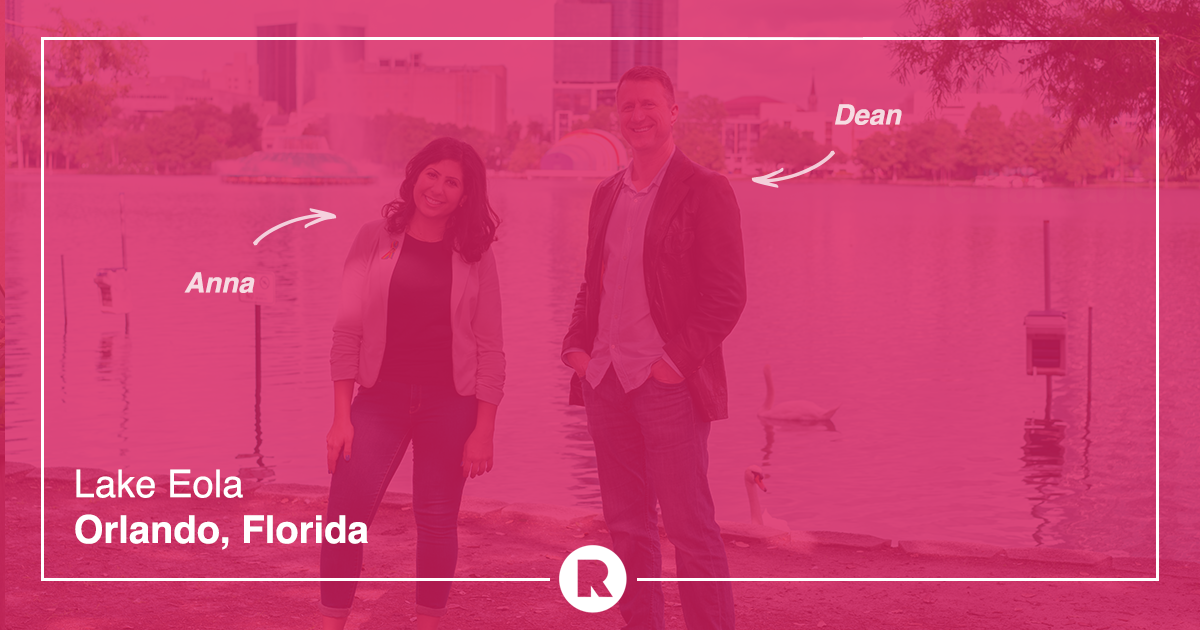
Dean: Alright Anna, so I was talking to my colleague, Tori, who has a twin named Erica, and we’ve chatted a bit about what it’s like being a twin. That’s why the first question I want to ask you is how has having a twin helped shape you into who you are?
Anna: Yeah, I mean my twin sister and I are cut from the same thread, so we’re together all the time. Keep in mind that for me growing up, I lost my mom when I was 13-years-old, so together we lost a mom … we could have each other’s back and be a source of empathy for one another and just hold each other tight during those really tough times. I don’t know honestly what I would have done if I didn’t have her with me in that capacity. I think I’m who I am today because I was able to have that support system that was right next to me 24/7 and to that point, we hold each other accountable, she pushes me to be a better progressive and a better Democrat. I push her in ways that I feel would be good for her growth as well, so it’s good. It’s pretty cool to have a twin.
Dean: In what ways are you different?
Anna: Ah! That’s a good question!
Dean: I always hear about all these ways that we just magically did this together and we didn’t even coordinate it, but how are you different?
Anna: Yeah, yeah, yeah. Sometimes, I’ll leave the house with the same colors on and it’s like what is going on. It’s like twin kismet. But how are we different? People used to say that I have a very unique laugh, but these days her laugh sounds more and more like mine, so now we’re at the same tone when it comes to that, too. Okay, well here’s one. It’s probably because I’m running for office right now, but Ida is very good at self-care. She makes intentional time to go on a vacation with friends or to go spend time with friends, but for me – because my schedule is just so crazy – that time is just really hard for me to find. It’s hard for Ida, too, but she just really makes it a priority and I honor that and I try to be more like that, but I just struggle. As an example, even this weekend, she’s in DC with our roommate and friend and she’s able to kind of carve out that self-care component that for me in my life, I just struggle to find. She’s also a lot better at cleaning the litter box [laughs] so she gets to it before I do, so I try to practice and be better about that stuff, too. But overall, I’m serious, we’re just very similar with our work ethic and our approach to life. She’s had a lot more career changes, but all in the same progressive world of social justice where I’ve kind of stayed in the same place for six years. That could also be a reflection of a difference between us, too.
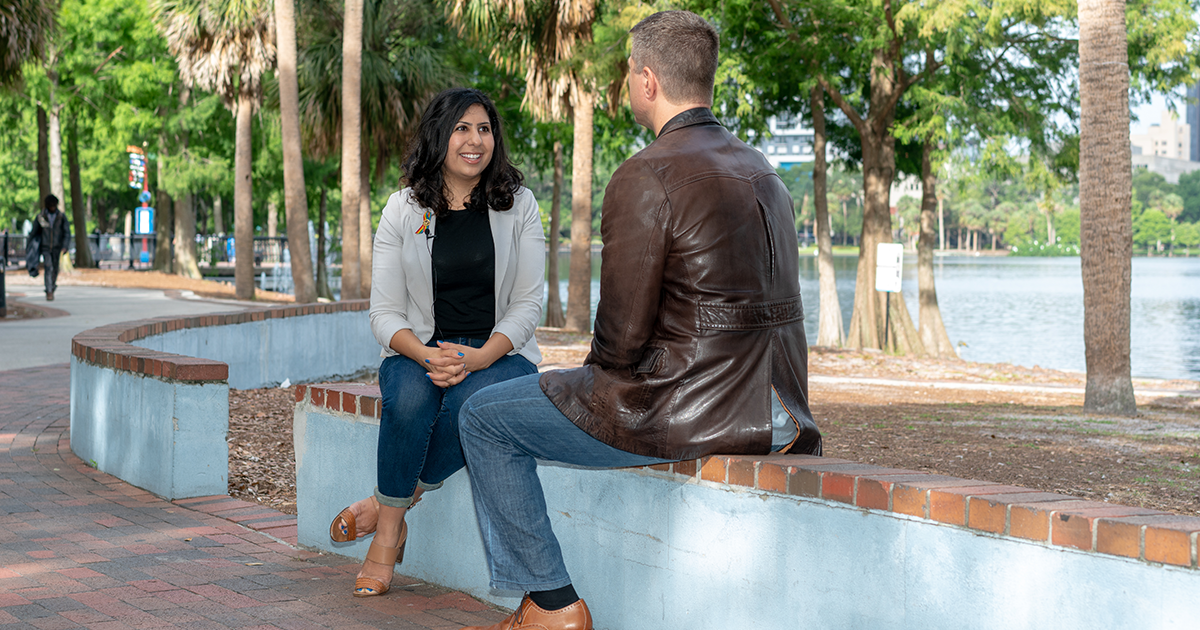
Dean: I’m really big into mentoring and I like to ask my interviewees, is there a mentor that you’ve had that has really helped influence or mold you?
Anna: Absolutely. Mr. Norris, who was my AP government teacher at University High School.
Dean: Cool!
Anna: Yeah, a throwback.
… it reignited my love for civics.
Dean: What was the big lesson or takeaway there?
Anna: So, I was very politically engaged when I was 10-years-old and then lost my mom when I was 13, so I was on this trajectory of not being very politically engaged for like three or four years. Then, I walked into Mr. Norris’ AP government class, I was 17-years-old … this was around the time of President Barack Obama’s election, so there was a lot of energy in our nation, but Mr. Norris who was this everyday high school teacher, it was actually his first time ever teaching AP government, and …
Dean: So you were the guinea pigs?
Anna: We were the guinea pigs! We were the experimentation. He just brought to the classroom this incredible sense of purpose for all of us. He talked about women’s issues, immigrant rights, civil rights, … He just brought all these topics to life and I sat there just taking it all in and it reignited my love for civics. I knew going into college that I would at least minor in political science and eventually switch it to a major, but to this day Mr. Norris continues to be one of my biggest cheerleaders and mentors and I lean on him even for like support, as moral support, but also for some political advice from time to time, too, because he’s such an authentic and incredible man. I’m just so grateful to have him as one of my foundational people to this day.
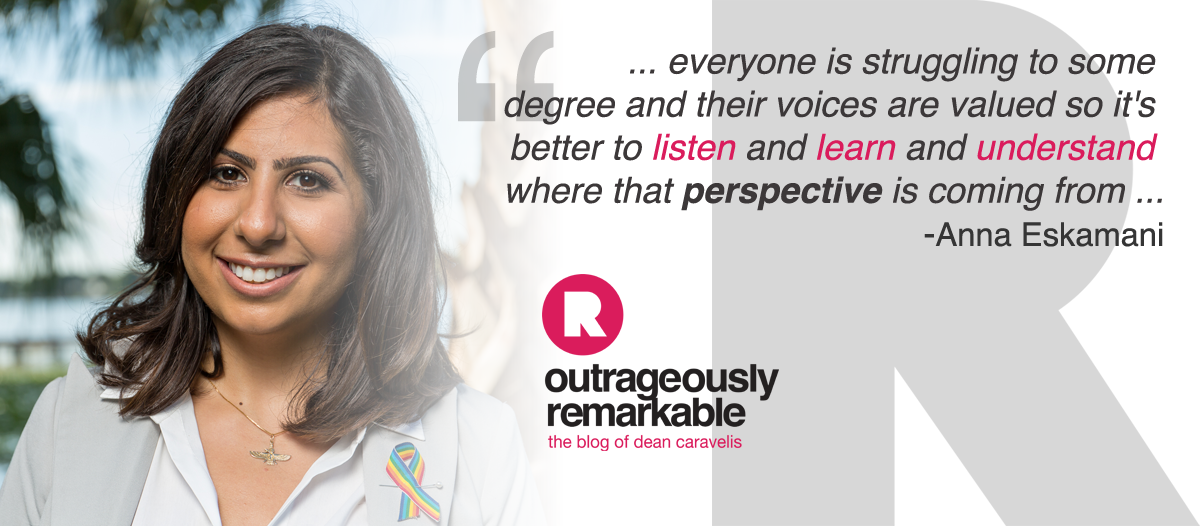
Dean: So I imagine that while you were in Mr. Norris’ class you might have been inspired to run for office, but can you pinpoint the moment that you decided that you were definitely running for office?
Anna: Yeah, it was after the 2016 elections when I hit this wall of frustration that nothing is going to change unless we elect the right people, so, of course, I started encouraging all of my girlfriends to run. They looked back at me and said well why aren’t you running? So that was kind of ‘the moment’ where I realized that if I didn’t demonstrate the courage to run, why would anyone else run? For this seat, House District 47, at the time that I was making the decision to run, there was an incumbent in this seat that I have worked with in the past and it was a challenge for me to accept that I was potentially going to run against someone that I had worked with and had been cordial with in the past. We definitely didn’t agree on every issue, but I really had to find my own source of strength in that decision. Ultimately, as we were planning, he made the decision to run for Congress and the seat became empty, but I remember sitting at Drunken Monkey and having to just embrace that concept of running against someone that I know and being okay with it.
Dean: Right. Is there any advice that you can give young people right now on something that they can be doing or things that they can be doing to help prepare them to run for office?
Anna: Absolutely. So you mentioned mentors and how important those are, so hands down, find your mentors. Whether they are your high school teachers, your college professors, your church leader … however, a mentor comes into your life, identify them, build relationships with them, and keep in touch with them over time. The other part that ties into mentorship is just relationships.
Those are the ones that will be your first donors …
Dean: Start networking?
Anna: Yeah! Absolutely! And again, maintain that. I have some girlfriends who want to go back to grad school and they struggle to find anyone who can do a letter of recommendation for them because they lost touch with those mentors or those people they met at different receptions or in college settings. It’s just like now you need to start from square one and you shouldn’t have to. I’ll tell you that when you’re first thinking about running for office, step one is trying to analyze how much money you might be able to raise from your personal network. I call that your love money list and so these are people that you’ve worked with, they know you, even if they aren’t engaged in politics, they might still give to you because they care about you and who you are. You want that list to be huge, so really build those relationships, give without expectation because you’ll be really surprised about how much others are willing to give to you when you reconnect with that and that makes it really meaningful as a campaign because then you’re fueled by people who really, truly care about you and are vesting in you. They aren’t vesting in you because they have some political agenda. They truly just care about you and your success. Those are the gifts that mean the most. Those are the ones that will be your first donors and will give you your momentum.
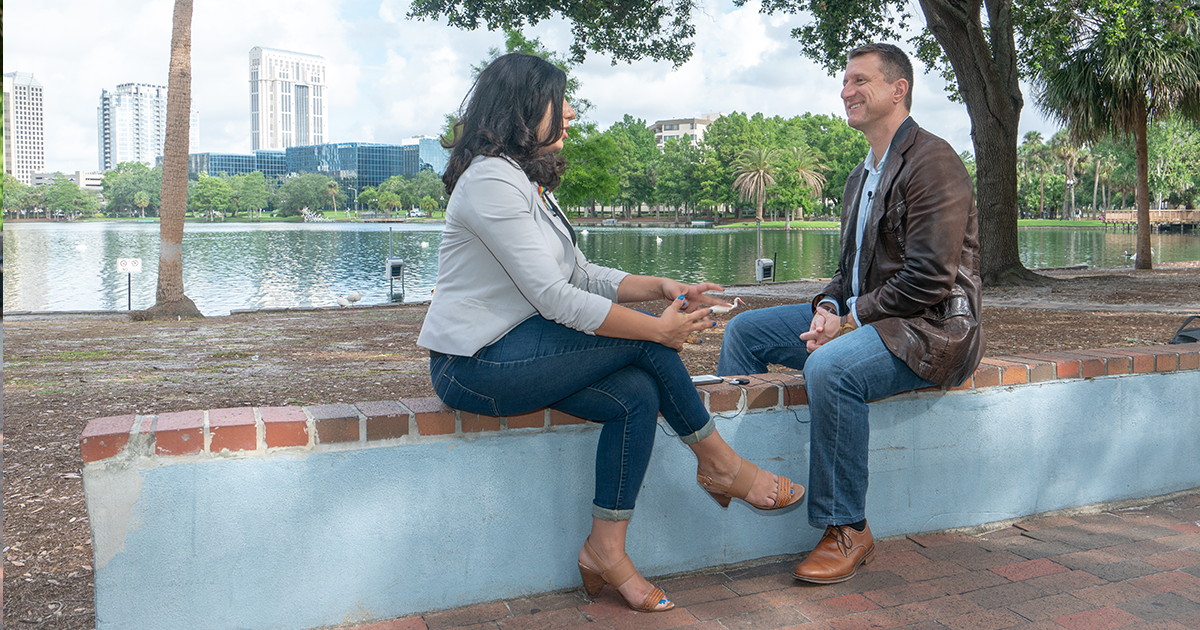
Dean: With young people and networking, I think that the observation that I’ve made is that it’s all or nothing. They either connect with you and then don’t connect with you because they don’t want to bother you or it’s hey do you want to do coffee and can you help me with this, can you help me with that?
Anna: [laughing] Can I tell you a story of my first solo event that I had to network on my own? That’s the thing, too. I feel like a lot of folks don’t want to go to something alone and they have to have a backup or wing person. For me, I was 20-years-old when I went to my first networking event by myself and it was a private house party type of reception and some of the women had just gotten back from Cuba, so that was like the theme of the entire night. I was invited to go and I was like sure, I’ll go. Not only am I going by myself, but the age difference was a pretty large amount. These are women who are retired or very experienced in their careers, so a very different demographic than me at the time, but I just walked in there and started talking to everyone and making friends and had no type of expectation. I wasn’t asking for anything in return, it was just getting to know people. That was a growing experience for me as a 20-year-old, to be comfortable in my own skin and to be comfortable in this environment without knowing anyone. Also, keep in mind that I was 20 and I wasn’t even of legal age. Sometimes having a drink in our hand is like a comfort to navigate those awkward moments and I couldn’t even do that, so you know. I had to just dive in and I’m so grateful for that moment and for the love that everyone showed me because that helped me have confidence in environments where, in a lot of cases, I am walking into spaces to this day by myself and needing to connect with folks there in a way that’s not transactional. And that comes with practice, so I encourage young people to get out of their comfort zone and go to these environments and take a risk to see what happens.
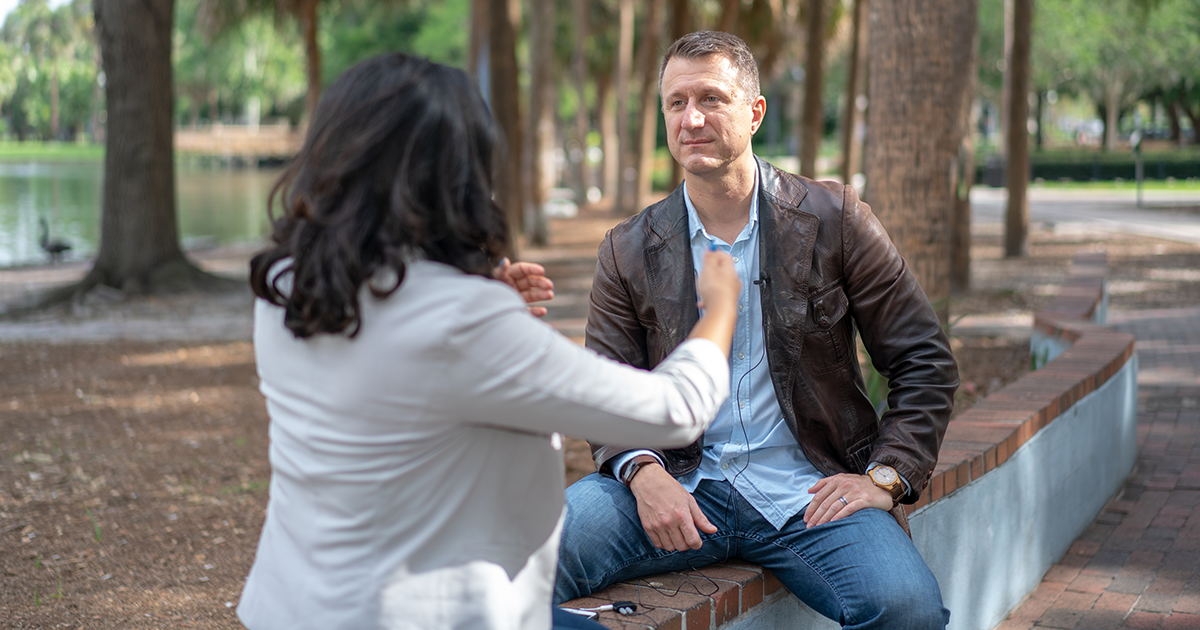
Dean: That took a lot of courage and so does running for office. I don’t know how much you can share about it, but what is the scariest part about running for office?
Anna: Yeah, it’s a good question. I kind of lean on just how much it costs. I mean, it’s scary how much money you need. It really is inappropriate how much money you need. We’ve raised about a quarter million so far in my campaign and that’s impressive, but from my eyes looking at all of the past races, it’s still not enough. So here we are, having raised a quarter million, but still feeling this pressure to do even more. And that locks out so many everyday folks from running for office. It narrows the playing field.
… something else that is scary is, of course, the thought of losing.
Dean: Are there any unexpected money sucks that maybe aren’t obvious in the budget?
Anna: Well, postage. [laughs] I mean, postage and printing are very expensive. That will be a candidate’s main expenses is just mailing things. We go through so many stamps, even when it comes to donor thank you letters, to postcards, to eventually doing mass mail pieces when you’re on the campaign trail. You know, a lot of folks spend a lot of money on consultants and that can be a money suck if you’re not careful. Fortunately for us, I have a lot of experience in just organizing so that’s helped us keep those costs low because I’ve been able to make decisions by consulting with mentors and our team, but I’ve seen other candidates who spend a lot of money on services that they might not really need, but for some reason they feel like it’s worth investing in.
I think something else that is scary is, of course, the thought of losing. That’s one that keeps a lot of candidates out of the race and one of the first steps that I took when I made that decision to run back in 2017 was I actually wrote what I would say if I lost. I did that to embrace the notion of failure and to be okay with that, but to also uncover the victory in a loss and for me, it took shape in two ways. One, in telling the stories that no one else is going to share. Whether it’s about Black Lives Matter, or Say Her Name, or Never Again, or Me Too, … We have to integrate this into the greater policy conversation because they’re all impacted by policy. And then also, this notion of building and leading with new leaders. I mentioned our campaign team and it is intergenerational by far, but we also have a lot of grunt work being led by young people and that excites me because talking about me being a mentor to them and then helping them have the courage to go to an event by themselves. We attended a Democratic Gala in Highlands County, which is like the boonies of Florida, and one of my interns had to sit at a different table and I was texting her to tell her to talk to everyone else at her table because she was on her phone. Again, I’m so excited because the environments that we create and foster are ones where new leaders will blossom and they’ll be the next candidates, campaign managers, and fundraisers and that makes all of this worth it.
Dean: I guess this is maybe a personal question. One of the reasons I always thought that I would never run for office is this unspoken thing that you need to have knowledge about everything because anybody can ask you anything at any time.
Anna: I know!

Dean: So especially the opposition trying to catch you off guard about certain things. How do you handle that? I’m just curious.
Anna: I mean, it’s impossible to know everything, right? And you surround yourself with industry experts who can be of support. It was so funny, Dean. Three days ago, I spent five hours going through my campaign inbox and this was partly my fault because I reached out to so many think-tank experts and community leaders and industry leaders and business owners. I had just cast this wide net to talk to everyone that I can and bless their hearts, they’re all coming back to me so now I have to continue the conversation. So I was booking meetings and confirming coffee dates with so many different folks, some who are experts in recycling, some in water management, some who are really great in public education, some that are over at the Space Coast. We have just cast this incredible net to glean and learn from people who are experts in this work. I mean yesterday, I had a meeting with community bankers, learning about some of the issues that they face. I do my best to do my research so that I can talk on different subjects, but at the end of the day, if I get a question that I don’t know the answer to, I think the best policy is to let that person know that I don’t know the answer to that question, but let me get back to you, or what’s your perspective on it? I’m never afraid to say I don’t know, which I think is a deep contrast to a lot of politicians that we have. Many folks don’t want to admit fault, they don’t want to admit that they’re wrong, and I’ll be the first person to say that my perspective on this used to be here, but now it’s here, and to demonstrate that shift. I think that’s one reason why people are so attracted to our campaign because we’re so authentic and so I’m never going to pretend like I know everything. We use our Facebook page as a tool to ask questions for feedback because we want to lift up those voices in Tallahassee. At the end of the day, I’m a facilitator for your growth and your change. It’s less about knowing everything and more about doing my part to ensure I understand all the problems that we face and all the potential solutions and then collectively help make the right decisions.
… take the elevator down a few notches
Dean: Whenever you meet with someone who is maybe quite a contrast from you, how do you bridge that gap? Is there like a go-to issue? What do you do so that it doesn’t turn into a hot-button conversation?
Anna: Such a good question! I always lead with empathy and I’ve always been an empathetic person. I didn’t really learn what the word empathy truly meant until about three years ago when I was reading Brene Brown. She really speaks to the power of vulnerability and those notions, so now I know that not only am I an empathetic person, but I practice empathy all the time. My first word of advice and what I integrate into my campaign and my team is empathy because at the end of the day, everyone is struggling to some degree and their voices are valued so it’s better to listen and learn and understand where that perspective is coming from … take the elevator down a few notches and really learn why they feel that way. If we can unpack that, chances are that we can find a solution, it might just have to be a little bit beyond the issue at hand.
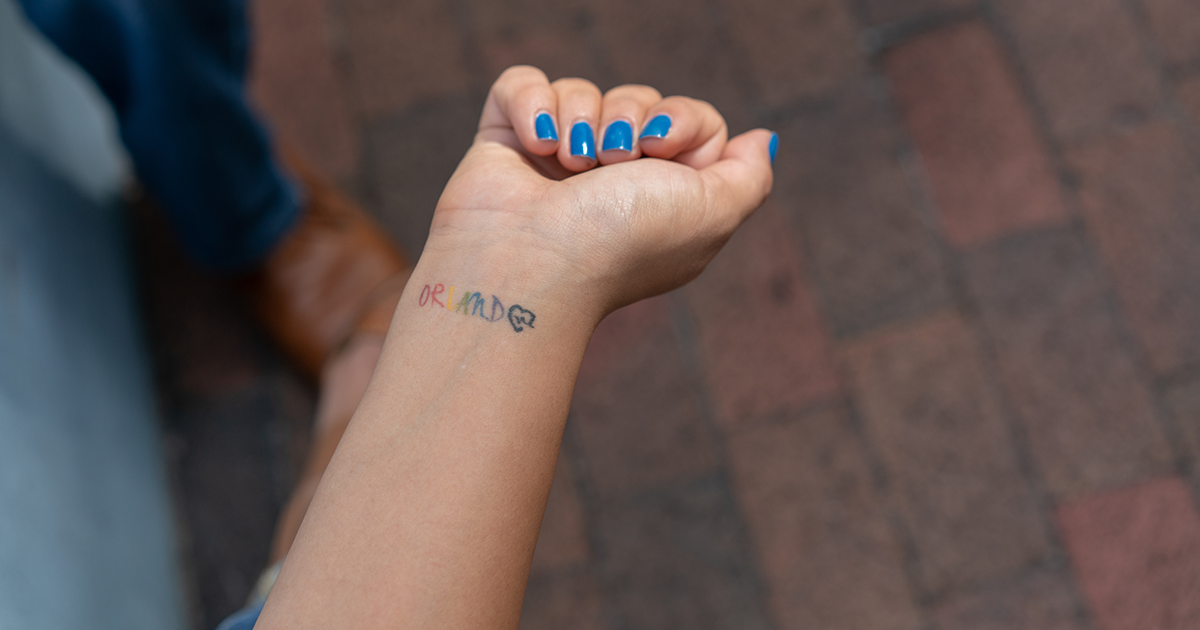
Dean: It could be personal, too.
Anna: Absolutely. Maybe they had a trauma in their life or they grew up in an environment prone to XYZ, but yeah, a lot of it is rooted in something much deeper. Unfortunately, in politics, I think that people often feel like there is no time to make that effort and I push back against that notion. We have to make time. I will press pause on everything to check in with a teammate or check in with a constituent. I will go out of my way … I met a constituent at the doors who was not registered to vote and it was so funny because she told me that none of her kids were registered to vote and I was like well who is this person because there was an 18-year-old who was registered to vote in this house. She was like wait, that’s one of my sons, and it was a really funny moment because this was a mom who was saying that she wasn’t registered, her mom is not registered, and her kids aren’t and they’ve never been. That was kind of like just matter of fact. Sure enough, the son got registered after the election so there was some sort of awakening for him. So, I actually mailed the mom a voter registration form and a stamped return envelope and mailed it all to her and I’ll check up with her to see if she actually did it, but that’s the effort that our campaign makes. We go the extra mile to really help people at their level. We have already been serving as a referral network for folks that have different issues, whether they have trouble paying their bills or something. We had a constituent who got a ticket over in Brevard County and didn’t know what to do with it, so we did the research and helped get them assistance. It’s like we’re already operating as elected officials, but we do our part to find that common ground because I think everybody wants to live a happy and healthy life, it’s just how do we get there?
‘Han Solo was my first crush’
Dean: Is empathy scalable in the 24/7 news cycle, social media world?
Anna: I try. Unfortunately, when it comes to the 24-hour news cycle, conflict is …
Dean: … What drives eyeballs.
Anna: Exactly. I know it. I know it. The most news attention that we get on the campaign trail is often conflict. We had a Republican representative who made comments about my voice recently …
Dean: You don’t have to worry [about people commenting about your voice], this isn’t a podcast! It’s all written on my blog …
Anna: [laughs] When he said I was a screecher, it was ridiculous! He also made comments like we have to stop Anna and it was just like so offensive on multiple levels. We did a fundraising email off it, we did not tell the media about it, but they saw the email so they wrote an article about it so that conflict is what often drives the news so we’re combating with ratings, with advertisers that will invest for ratings. So it’s like this whole world that we have to live alongside, but we also have to build our own community of empathy. I try to live that through our digital outlets. We are very active on Facebook, Twitter, Instagram, and YouTube, so I try to use those platforms to have stability. We absolutely attract opposing viewpoints, we attract really aggressive trolls, too, but we just do our part to not escalate the situation; try to create some commonality. I’m a big Star Wars fan, like ‘Han Solo was my first crush’ level of Star Wars fan, and for May the Fourth, we posted a photo. I have a mug that says A Woman’s Place Is In The Resistance with a photo of Princess Leia, so I held that coffee cup and it was basically the photo. One of my frequent opposers commented [on the Star Wars post] with ‘what are the rules around guns in the resistance’? And so I was like are you trying to ruin Star Wars for me right now? How dare you. And so I commented back and said it’s important that we each practice responsible blaster and lightsaber policies and he never responded back, but the amount of laughter that we got from it was great. So, you know, I just turn to like whatever I can do to try and make this better and to demonstrate that we can still have a laugh together. I’m not an evil person.
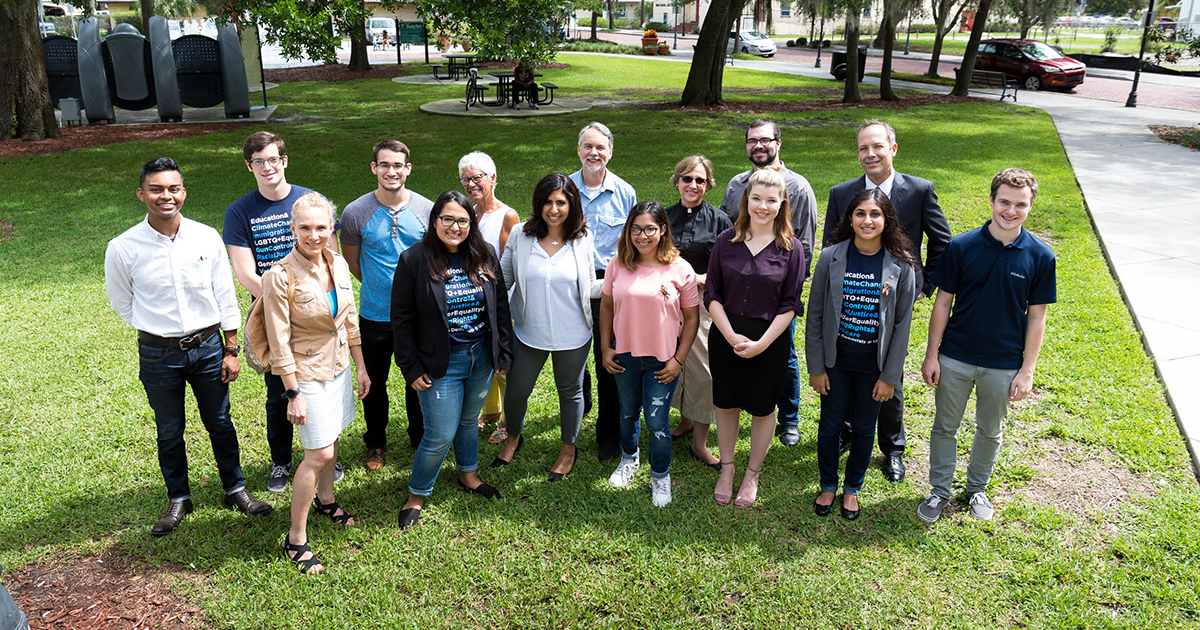
Dean: Maybe packaging empathy into humor as a catalyst to drive it through? So, I have a more macro-level question. This is just an opinion thing, do you think that there is room for a third party since we had this kind of polarization? Do you see a third party emerging and if so, what would that look like?
Anna: I would love a third party. I would love many parties. When I first got registered to vote, I was NPA (no party affiliation). I changed to Democrat in 2010 because I met the College Democrats at UCF and that’s where I found my connection to the party. It wasn’t through icons, celebrities, or even generic party values. I became a Democrat because I got to know other Democrats. That’s what brought me into the fold. The system does not reflect the broad views of Americans. The reality is that we have a closed primary system, which is what we have in Florida. Both of our candidates on either side, if they have a primary, they’re going to go to the extremes of their party to try to activate their base and get those votes. What that means is that you have candidates competing for a small number of voters, but voters that have really really extreme views. Once you get through the primary, now you’re in the general, you have candidates who don’t necessarily reflect the greater needs of the community because they’ve been all the way shifted to these opposing sides. I think step one in a state like Florida would be open primaries because at the very least you can then have more diverse viewpoints and people can make a decision collectively. That would help. And then if the seat is leaning more progressive, those two candidates are the ones that would make it. Right now, we’re going to have two of the most extreme make it to the final. We’ve been really blessed in our campaign because we don’t have a primary so we can really just be ourselves. Obviously, just being ourselves has really resonated with the majority of our constituents just based on the incredible feedback that we get all the time.
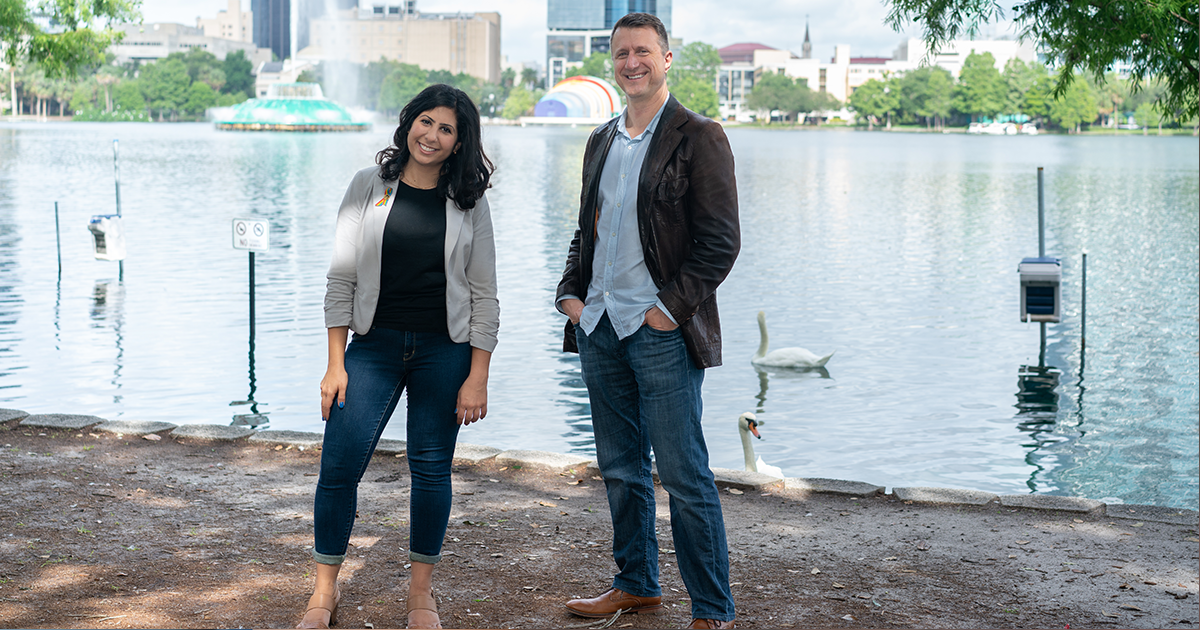
I met a woman the other day in College Park who disagrees with me on guns, but we were able to find agreement on a lot of other issues. I told her that a majority of the time when you meet a candidate … this was her first time getting involved in politics because she just moved back to Florida from Arizona, so it was really cool to even have her there because she was getting re-exposed to this work. So I told her, you’re not ever going to agree with me on everything, but you can trust me to make the right decision and you can trust me to keep you informed and reach out to you. She left with the Republicans for Anna sticker, which I thought was really cool. We’re building that culture on our campaign, but I don’t see a viable third party happening anytime soon. I think it’s going to take systematic change and it takes electing good people within the current party structure to lead that change and to allow others to blossom, but keep in mind that the status quo doesn’t want to be disrupted. And so I’ll tell you, even my perspective on open primaries is not very popular. Most Democrats and Republicans don’t like it because they see it as a threat to the current power structure. And it is, but I think it’s necessary if we’re going to have a real democracy that represents who we are as Floridians.
Dean: Anna, if you could send a tweet-sized text message to everybody in the district and they were open to receiving that, what would it say?
Anna: Vote on November 6th. [laughs] Yeah, just please vote. Voter turnout is really depressing in this country and the only reason why we don’t have the right people in office is that we’re not voting, especially during midterms. I’m hopeful that 2018 seems to be leading some change and increased number of voters, but if we had 100% or even 90% participation in our elections, our elected officials would respond to us. For me, it’s less about who they are, like we’ll vote for the right people, but those politicians will respond to you because they realize that they have to respond to their constituents and right now, I’ll tell you that many elected officials do not respond to their constituents or they verbatim will tell you that they only represent those who voted for them, so they don’t even care about the opposing voters or try to meet their needs. They’re just concerned about what does it take to win again and if we were more participatory in our politics, elected officials, no matter what their personal view might be, they would absolutely evolve on issues because they’re hearing it from the voters. That’s a game changer. To actually have a participatory and authentic democracy that serves people first before anything else.
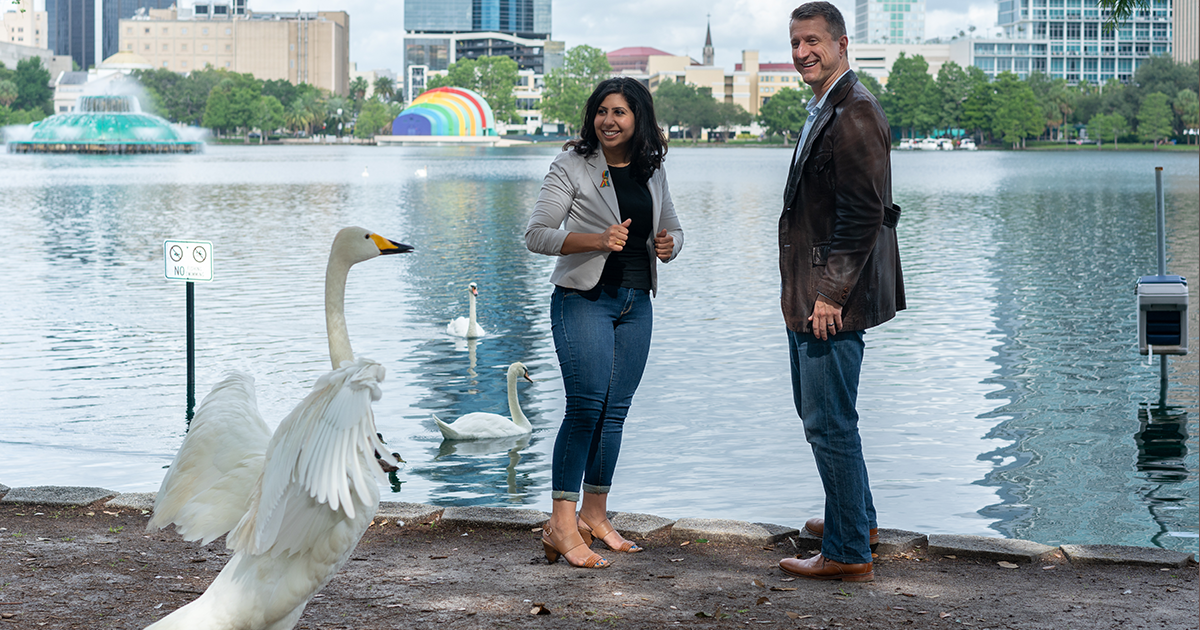
Dean: This question that I like to ask all of my interviewees requires you to kind of reflect in the third person. With all of the awards and accolades and success that you’ve been able to have at such a young age, if you could define the essence of what makes you outrageously remarkable, what would it be?
Anna: Resilience. Yeah, complete resilience. I still manage the trauma of losing my mom at a young age. That is always in the back of my mind and I miss her every single second. And so I’m very good at finding power in pain and I’ve been doing that since I was 13-years-old. I’ve been doing that since Pulse, I’ve been doing that since Parkland now, so I manage crisis really, really well. I credit that to my own sense of resilience, my commitment to making sure that every person in this great state doesn’t have to experience that kind of trauma. Like no one should have to be navigating pain every single day and many of us are. And so I ground myself in this sense of resilience and purpose and that’s what keeps me focused late at night and awake early in the day. That’s what brings me joy. I get a lot of joy from seeing the impact that my work can have on others. It’s really important to me.
Dean: About resilience, my sister has this tattoo on her wrist that says ‘hope.’ She’s been an athlete her whole life so whenever she’s going through pain in sports or in life, she looks at that and when she does, what it stands for is ‘hold on, pain ends.’
Anna: Oh, wow.
Dean: Do you have like a mantra or a quote that helps you stay so resilient?
Anna: That’s so beautiful. Well first, it reminds me of my tattoo. I have a Pulse tattoo and so this is Orlando with the Pulse hearts on it and so this is a constant reminder of purpose for me and for why I fight. To the notion of a mantra, one of my favorite quotes came from Ben of Credo Coffee …
Dean: He was my first interview for the blog.
Anna: Really? I don’t know if Ben remembers saying this, but years ago, Ben was speaking at a conference at UCF and he was talking about his journey and his sense of purpose and he talks about how if you are happy with who you are becoming, you can be content in any situation. I have held onto that since I guess that was 2011. It’s kind of full circle because our campaign office is at Credo Conduit, so you know, we kind of continue to navigate this world together, but that’s something that I think about all the time.
Dean: And that’s full circle because this is the approximate one year anniversary of my blog and Ben was the first one. Thank you, Anna.
Anna: That’s crazy! I love it. Such a pleasure, this was great.
____________
Want to keep up with this blog? GREAT! Subscribe here to be an insider.
Connect with Anna on Twitter & find out more about her campaign on her official website.
Pictures by Joshua Johnson, check out his photography work here. Also, are you a big fan of Lake Eola? Check out this Instagram page.